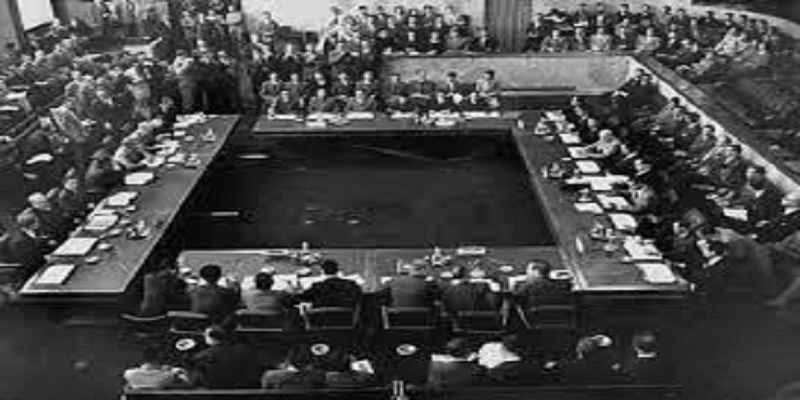Geneva Accord 1988
Pakistan. 1988 marked a pivotal moment in the global political scene. In 1988, a disastrous decade ended that resulted in destruction and bloodshed in Afghanistan and could harm Pakistan's security. Geneva Accord has a significant role in changing the world's political landscape. Pakistan, the Soviet Union, Afghanistan and the USA were participants in the Geneva agreement in which Pakistan played a significant role in settling conditions to settle the Afghan dispute. After the agreement, numerous changes were made in the relations between Pakistan with the other participants. It is clear that Pakistan's international standing was elevated because of the Geneva accord, and the country became a significant mediator on international issues.
In 1979, the Soviet military intervened in its closest neighbour Afghanistan to annexe and integrate it into the sphere of the communist system. After a brief period, however, the mission became quite difficult for the Soviet Union. In the end, Afghan Mujahedeen, with the help of Pakistan and the international community, dealt an extremely damaging blow to the Soviet causes. Soviet leadership was aware of the expedition's failure, and the deteriorating social and economic conditions on a national scale forced Soviet leaders to emerge from the dire situation. Therefore, a process of negotiations for a settlement began in the early part of 1981 under favourable UN conditions. After long-running talks and negotiations, the final agreement was concluded in Geneva on April 14th of, 1988. In the Accord, a bilateral agreement was made by Pakistan and Afghanistan to return refugees following the guarantees made by USA and Soviet Union. A timeframe was established to allow the withdrawal of Soviet troops from Afghanistan, which was set at nine months, and 50 per cent of forces were required to be withdrawn after three months. Afghan resistance groups did not participate in the deal, nor did they accept it. They have caused terrible effects on Afghanistan following the withdrawal from Soviet forces.
The Accord marked a milestone in Pakistan's military and diplomatic strategy. It helped improve Pakistan's diplomatic standing throughout the world. However, it also directly impacted Pakistan's internal and external areas. There was already tension between Premier Muhammad Khan Jonejo and President Zia-ul-Haq. The signature of the Accord by the former foreign minister only exacerbated the conflict because Zia adopted a tricky position regarding establishing a pro-Pakistan-based government in Afghanistan founded on the resistance groups, which was not a good idea for the Soviets. Then, using it as the basis for Zia disregarded the legitimacy of a legitimately elected government which resulted in a significant setback for the newly established democratic system.
The spirit of the Geneva Accord was in an agreement between Afghanistan and Pakistan wherein the Soviet Union and the USA were the sole guarantors of non-interference and the non-interference of the other's internal matters. Following the withdrawal of the Soviet Union, incompetent Najibullah could not handle the deteriorating situation within Afghanistan, and Pakistan demanded the creation of a legitimate and representative people's government. The process of the civil war was triggered between various ethnic groups. Ultimately Najibullah government was removed, and the new pro-Pakistani government was established in Kabul. Pakistan was a staunch supporter of the mujahidin, which led to tensions between Iran and Pakistan because Iran was against being controlled by the Sunni mujahidin.
It was also the first time that the Geneva Accord also solved the threat to the security of Pakistan from the Soviets since, during the Afghan conflict, the Soviet Union threatened Pakistan several times, warning the country that Pakistan played with fire because it supported the mujahidin. A couple of days after the signing of the Geneva Accord, the incident of Zia's plane has also been thought to be a plot by the Soviets, which could be taken to mean or could be an element of the US strategy to rid the world of Zia. Additionally, the US stopped all the aid offered and provided during the Afghan crisis to help settle refugees. US restrictions made it more difficult for Pakistan to take on this burden. However, it is stipulated in the Geneva agreement to ensure that 1.5 million refugees will return to Afghanistan. Afghanistan's civil war and chaos did not offer the most secure way to return the refugees. The refugees caused numerous problems in Pakistan.
In 1991, the vast Soviet empire fell apart, and Six Muslim states emerged from Central Asia. Pakistan began to establish close relations with these countries, as Russia was looking to establish the government of Russia in these newly created states. On the other hand, Iran also sought to expand its influence in these new states, which led to hatred and conflict between Iran and Pakistan.
In conclusion, the Geneva Accord was a victory for the brave Afghans and a high quality of Pakistan's diplomacy and military strategy. Diplomatically, it was a successful initiative in which, for the first time in history, the Soviet Union withdrew its forces from a nation. It brought about a variety of repercussions for problems throughout the region. Following the Accord, numerous turbulences occurred in the relationships between Pakistan with other nations. The following Geneva Accord proved very hard and challenging in economics and society in Pakistan.

